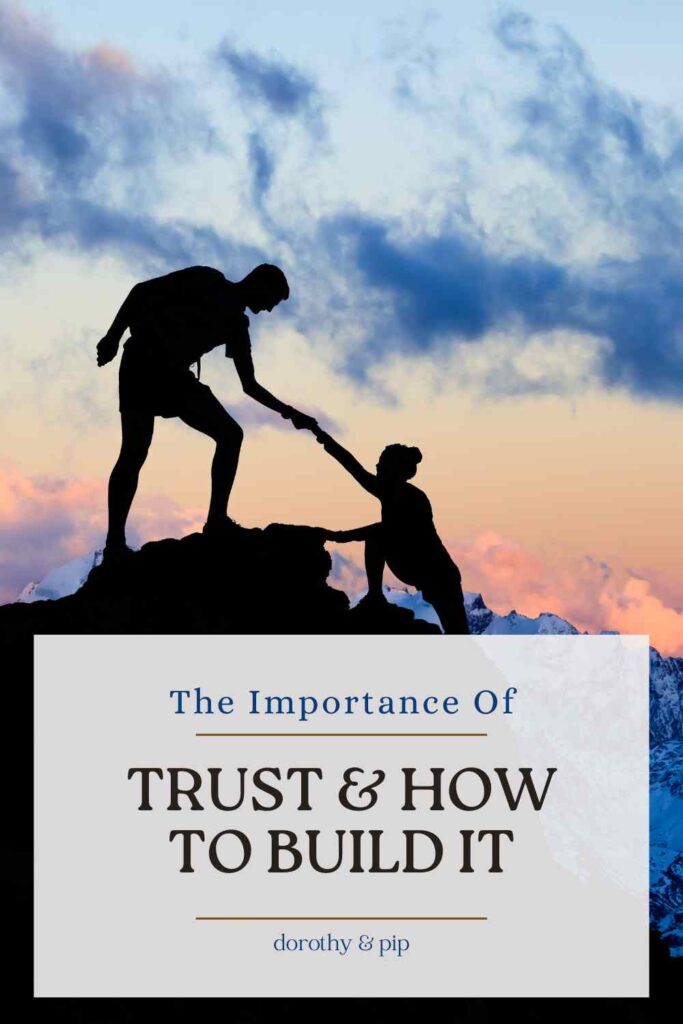Trust is the cornerstone of healthy relationships, personal well-being, and professional success.
This guide explores the significance of trust and provides practical steps to build and maintain it.
Understanding Trust
The Foundations of Trust
Trust is a multifaceted concept crucial for the stability and depth of all types of relationships. It encompasses several components:
- Reliability: Consistently meeting expectations and following through on commitments.
- Honesty: Being truthful and transparent in communication.
- Competence: Demonstrating the skills and knowledge needed to meet expectations.
The Psychology of Trust
Understanding how trust is formed and maintained helps in recognizing its importance:
- Formation: Trust begins with small acts of reliability and honesty, gradually building up over time.
- Maintenance: Regular reinforcement through consistent behavior and open communication is key.
Types of Trust
Different contexts require different kinds of trust:
- Interpersonal Trust: Vital for personal relationships, built through mutual respect and understanding.
- Institutional Trust: Trust in organizations and systems, influenced by their transparency and accountability.
- Self-Trust: Confidence in one’s own abilities and judgments, foundational for personal growth and resilience.

The Importance of Trust
Trust in Personal Relationships
Trust is the bedrock of meaningful and lasting connections:
- Friendships and Family: Trust fosters deeper bonds and mutual support.
- Romantic Relationships: Essential for intimacy and partnership, trust enables vulnerability and closeness.
Trust in Professional Settings
A trustworthy work environment promotes efficiency and satisfaction:
- Colleagues: Trust among team members enhances cooperation and reduces conflicts.
- Leadership: Trust in leaders inspires confidence and loyalty, driving organizational success.
Trust in Society
A society with high levels of trust enjoys greater cohesion and prosperity:
- Public Institutions: Trust in government and public services is crucial for societal stability.
- Communities: Trust among community members leads to safer, more supportive environments.

The Benefits of Trust
Emotional and Psychological Benefits
Trust has profound effects on mental health and well-being:
- Reduced Stress: Trusting relationships alleviate anxiety and provide emotional support.
- Increased Happiness: A trustworthy environment contributes to overall life satisfaction.
Social Benefits
Trust enriches social interactions and relationships:
- Stronger Bonds: Trust deepens connections and fosters mutual respect.
- Enhanced Cooperation: Trusting groups work better together, achieving common goals more efficiently.
Professional Benefits
Trust drives professional growth and success:
- Job Satisfaction: Trust in the workplace boosts morale and engagement.
- Innovation and Risk-Taking: A trusting environment encourages creativity and the pursuit of new ideas.
Barriers to Trust
Common Obstacles
Building and maintaining trust can be challenging due to various factors:
- Fear of Vulnerability: Many people hesitate to trust others because they fear being hurt or betrayed.
- Past Experiences: Previous betrayals or disappointments can make it difficult to trust again.
- Miscommunication: Misunderstandings and lack of clear communication can erode trust.
Cultural and Societal Factors
Societal norms and cultural backgrounds can also influence trust levels:
- Societal Norms: Societies that value individualism might struggle with trust more than those that emphasize collectivism and community.
- Cultural Differences: Different cultures have varying expectations and norms regarding trust, which can lead to misunderstandings and mistrust.

How to Build Trust
Building Trust in Personal Relationships
Creating a foundation of trust in personal relationships involves several key practices:
- Effective Communication:
- Active Listening: Show genuine interest and understanding in conversations.
- Empathy: Understand and share the feelings of others.
- Consistency and Reliability:
- Keep Promises: Follow through on commitments.
- Be Dependable: Be there for others in times of need.
- Transparency and Honesty:
- Be Open: Share thoughts and feelings honestly.
- Admit Mistakes: Own up to errors and work to make amends.
Building Trust in Professional Settings
Trust in the workplace enhances productivity and morale:
- Leading by Example:
- Demonstrate Trustworthiness: Be honest, reliable, and competent.
- Show Integrity: Make ethical decisions and stand by them.
- Encouraging Open Dialogue:
- Feedback Culture: Create an environment where feedback is welcomed and acted upon.
- Open Communication: Ensure transparency in processes and decisions.
- Recognizing Trust-Building Behaviors:
- Acknowledge Efforts: Recognize and reward actions that build trust.
- Promote Teamwork: Encourage collaboration and mutual support.
Rebuilding Trust After Betrayal
When trust is broken, it can be rebuilt with effort and patience:
- Steps to Take:
- Acknowledge the Betrayal: Admit the mistake and understand its impact.
- Sincere Apologies: Offer genuine apologies and take responsibility.
- Making Amends:
- Correct the Wrong: Take steps to rectify the situation.
- Demonstrate Change: Show consistent behavior over time to rebuild trust.
- Patience and Time:
- Give Space: Allow the hurt party time to heal.
- Be Patient: Understand that rebuilding trust is a gradual process.
Trust in the Digital Age
Challenges of Building Trust Online
The digital age presents unique challenges to establishing trust:
- Anonymity: The lack of face-to-face interaction can make it harder to judge sincerity and reliability.
- Miscommunication: Tone and intent can be easily misinterpreted in text-based communication.
- Online Personas: People can create misleading online identities, making it difficult to discern genuine intentions.
The Role of Social Media and Digital Communication
Social media and digital platforms have changed how trust is built and perceived:
- Curated Content: People often share only the best aspects of their lives, which can create unrealistic expectations and mistrust.
- Echo Chambers: Algorithms that show content similar to what users already engage with can reinforce biases and reduce exposure to diverse perspectives.
Strategies for Building Trust Online
Despite these challenges, there are ways to foster trust in the digital realm:
- Authenticity and Transparency:
- Be Genuine: Share your true self and avoid creating a false persona.
- Be Open: Communicate openly about your intentions and boundaries.
- Building a Positive Online Presence:
- Consistent Behavior: Maintain a consistent and reliable online persona.
- Engagement: Actively engage with others in a respectful and meaningful way.
- Ensuring Privacy and Security:
- Protect Information: Be cautious about sharing personal information online.
- Use Secure Platforms: Choose platforms that prioritize user privacy and data security.
Building and maintaining trust is an ongoing journey that requires effort, patience, and commitment.
Prioritizing trust in your relationships, whether personal or professional, leads to deeper connections, enhanced cooperation, and overall well-being. Embrace the principles and strategies outlined in this guide to cultivate trust in all areas of your life.

Rebuilding Trust After Betrayal
Acknowledging the Betrayal
When trust is broken, the first step towards rebuilding it is to acknowledge the betrayal openly and honestly:
- Understand the Impact: Recognize the emotional and psychological effects the betrayal has had on the other person.
- Take Responsibility: Own up to your actions without making excuses. A sincere acknowledgment sets the stage for healing.
Sincere Apologies
A heartfelt apology is crucial for rebuilding trust:
- Express Regret: Clearly articulate your remorse for the hurt you caused.
- Show Empathy: Demonstrate that you understand and care about the other person’s feelings.
- Avoid Justifications: An apology should not include justifications for the betrayal; it should focus solely on expressing regret and seeking forgiveness.
Making Amends
Taking steps to rectify the situation shows commitment to rebuilding trust:
- Correct the Wrong: If possible, take concrete actions to fix the damage caused by the betrayal.
- Demonstrate Change: Show through your actions that you are committed to change and to preventing future betrayals.
Steps to Take When Trust is Broken
Rebuilding trust is a gradual process that requires consistent effort:
- Open Communication: Maintain open and honest dialogue to address any ongoing concerns and to reinforce your commitment to rebuilding trust.
- Patience and Understanding: Recognize that the hurt party may need time to heal and regain trust. Be patient and provide the support they need during this period.
Demonstrating Consistent Behavior
Consistency is key in the process of rebuilding trust:
- Reliable Actions: Continuously show that you can be relied upon to keep your promises and commitments.
- Transparent Communication: Be transparent in your actions and decisions to rebuild confidence in your intentions.
Patience and Time
Rebuilding trust cannot be rushed; it requires time and perseverance:
- Allow for Healing: Understand that the process of healing and rebuilding trust varies for each individual.
- Show Commitment: Demonstrate your long-term commitment to regaining trust through ongoing, trustworthy behavior.


